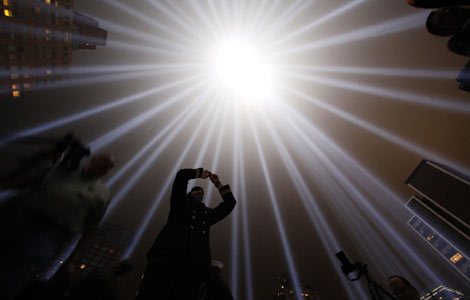Playboy goes retro, slashes price to 60 cents
Updated: 2011-09-12 20:45
(Agencies)
|
|||||||||||
LOS ANGELES - It was among the most exciting periods of Playboy founder Hugh Hefner's life, so what could be better in a bad economy than to retrace the 1960s' good times and give readers a break on the price of his magazine?
 |
|
The October 2011 cover of Playboy magazine is shown in this publicity photo released to Reuters September 12, 2011. [Photo/Agencies] |
Hefner is slashing the cost of Playboy's October issue, which hits newsstands this Friday, to 60 cents. His editors have styled the men's magazine with retro look matching 1961, when the first Playboy Club was founded, and linked it to the debut of TV show "The Playboy Club" by putting star Laura Benanti on the cover -- and inside the pages.
"It's hard to put into words the fact that, obviously, everything changed for me in that time frame," Hefner told Reuters. And that statement from a man who has made words one of the centerpieces of his life.
The octogenarian known as "Hef" who embodies a stylish life of posh nightclubs, wild parties, men's fashion, free speech and, of course, naked women, said that six years after he founded the magazine in 1953, his life changed quickly.
The magazine that made its biggest splash publishing nude pictures of Marilyn Monroe was, by that time, being read by millions. From late 1959 through 1960, he held his first jazz festival, hosted his first TV show and opened his initial Playboy Mansion in Chicago.
"Those were some of the best and most romantic years of my life," Hef said.
There is no doubt Hef will take a bath at newsstands with the October issue. But Playboy makes more money from subscriptions, and Hef said he expects to significantly make up the losses with increased advertising.
Editorial director Jimmy Jellinek said ad pages are up 70 percent for the October issue compared with last year, well beyond the 16 percent year-to-date boost the magazine had already seen in 2011. Moreover, the book has lured new advertisers in fashion, grooming and entertainment.
"This issue is a love letter to vintage Playboy," Jellinek said, "At the same time, we're also being relentlessly modern."
Broadway's Bunny
Indeed, among the hottest fashion trends for men are retro looks inspired by TV shows such as "Mad Men," which no doubt was an inspiration for other period programs like NBC's new "The Playboy Club," a fictional primetime drama about what goes on behind the scenes of one of the '60s-era nightclubs.
The October issue is inspired by that lifestyle with a 10-page spread featuring original Playboy "Bunnies," women who worked at the clubs, and an "insider's guide" that offers the chance to win a trip for two to the current Playboy Club at the Palms Casino Resort in Las Vegas.
Benanti, 32, an actress and singer who won Broadway's Tony for a revival of "Gypsy" and stars in TV's new "Playboy Club," slips into one of the Bunny costumes for the cover, then sheds some of her clothing for pictures inside the issue.
"I was nervous, but everybody made me feel comfortable," she said of her photo shoot with little more than a scarf.
The performer hadn't aspired to be a Playboy model. "Never. Never, never, never. My focus was being on Broadway...on my talent and never on my physical" looks.
But she talked with past models and "learned how much they loved the job and how much fun they were having," she said.
Where the TV show is concerned, Hef and Jellinek are excited about its September 19 premiere. If it's a hit for NBC, the publicity should bolster the magazine and real clubs, and if it's a miss, they don't see it as harming the Playboy brand.
As for criticism from conservative groups and activists, including long-time Hefner detractor, feminist Gloria Steinem, who have called upon viewers to boycott the show because they claim the magazine and the program objectify women, Hef has been hearing that since 1953. He sees their calls as little more than trying to get publicity for their own causes.
"I recognize there is a need to get publicity, so one has a certain motivation," he said. "I understand why Gloria would say the things she is saying because nobody remembers her, and I find that sad because I think she is a well-meaning lady."
Hot Topics
Libya conflict, Gaddafi, Oil spill, Palace Museum scandal, Inflation, Japan's new PM, Trapped miners, Mooncake tax, Weekly photos, Hurricane Irene
Editor's Picks

|

|

|

|

|

|







